Robert Kleiman
- 1972

Fellowship Title:
- Europe Beyond the Cold War
Fellowship Year:
- 1972
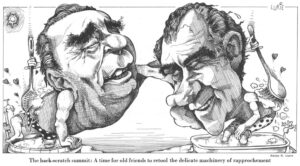
“The Real Question…Europe’s Security”
II. America’s Eastern Policy
London, England July 28, 1973 “Actions accepted from an ally whose role is less crucial can produce a crisis of confidence if carried out by a partner occupying a dominant position. When the United States acts unilaterally, disarray in the alliance is almost inevitable. Bilateral United States dealings with the Soviets from which our allies are excluded or about which they are informed only at the last moment are bound to magnify Third Force tendencies.” — Henry A. Kissinger, May 1964 “…the temptation of the Superpowers (is) to regulate, by means of their dialogue, the parceling out of world responsibilities…. “I do not know whether the year 1973 will be the ‘Year of Europe,’ but I am sure that in 1973 the question of the defense of Europe will be hovering in the background of all the talks which will be taking place in Europe and elsewhere…the real debate and the real question concern Europe’s security.” — French Foreign Minister Michel Jobert, June 1973 At the end of 1972, the Soviet Ambassador to France
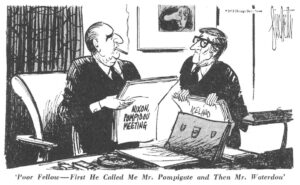
“The Real Question…Europe’s Security”
I. Politics Stops at the Water’s Edge?
London, England July 28, 1973 Henry Kissinger’s appeal for a bipartisan Watergate cease-fire on foreign policy issues to permit his work for a “lasting peace” to continue abroad, while the United States sorts itself out politically at home, strikes a chord in West Europe. On balance, despite many reservations, America’s allies rate the Nixon foreign policy and Mr. Kissinger favorably. Without forgetting the scars left by some of Washington’s hard-nosed methods in recent years — “We got the Watergate treatment too,” a high Common Market official commented — West European leaders are less concerned than Americans about the White House “horrors” and more horrified over the possibility of 3 1/2 years of Presidential paralysis overseas. They hope for Mr. Kissinger’s success in the efforts he reportedly has been making, with Mr. Nixon’s approval, to unite Democratic Senators and liberal Republican leaders, including his old patron, Nelson Rockefeller, on the next steps to consolidate détente with Russia and China and to revitalize the Atlantic partnership with West Europe. A return to the kind of consultation
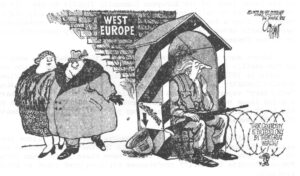
Atlantic Evolution: The Missing Links III
24 May, 1973 The search for solutions to the problems that haunt American relations with the European allies recalls Gertrude Stein’s last words on her deathbed. “What is the answer?” she whispered. There was a long silence. “Then,” she finally asked, “what is the question?” The Atlantic Allies have been seeking answers to their problems with little success and it may be that they are asking the wrong questions. With something like this in mind, Jean Monnet’s Action Committee for a United States of Europe has proposed a new look at the issues by two “Wise Men” named by the United States and the European Community. Their function would be “to investigate, not to negotiate.” There has been too much adversary negotiation across the Atlantic, too much maneuvering and posturing in search of national or regional advantage across the bargaining table. Mr. Monnet’s aim is to put the problems on one side of the table and the two “Wise men” on the other to assemble an agreed data base, analyze the issues and draw
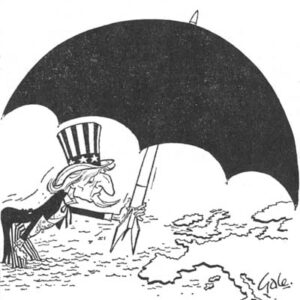
Atlantic Evolution: The Missing Links II
London, England May 23, 1973 Within days after Secretary of State George Marshall in 1947 called on Europe to unite for a joint attack on its problems, Foreign Secretary Bevin of Britain was assembling the leaders of the continent for a meeting in Paris to draft the response that led to the Marshall Plan and, later, to NATO, the Coal and Steel Community and the Common Market. If the response appears somewhat slower one month after Henry Kissinger’s April call for a comparable “new era of creativity in the West,” no one could be surprised. To unite to receive American aid naturally was easier than to unite to give aid to America, more blessed as that might be in the eyes of heaven and Richard Nixon. But there is another fundamental difference between 1947 and 1973. The Marshall Plan was not an act of pure generosity, but of enlightened self-interest; the United States expected to benefit, and did, from the stabilization and economic recovery of West Europe. The United States and a uniting Europe
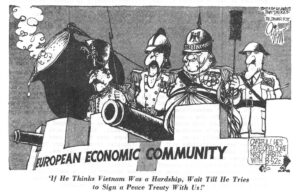
Atlantic Evolution: The Missing Links I
May 21, 1973 Watergate has raised many questions here about the prospects for the Nixon Administration’s long-heralded and increasingly controversial “Year of Europe,” particularly whether the President can still win the Congressional support essential to it. But it is evident now, despite confused initial reactions, that Henry Kissinger’s proposal for a “new Atlantic Charter” has accomplished its primary purpose. It has thrown a very large pebble into the European pond. Within the European Community and its nine member governments, which have long been preoccupied with domestic concerns, it has commanded the kind of attention that European-American relations have not received since the clash of Gaullist and Kennedy “Grand Designs.” An intricate negotiation is getting underway that promises to be as difficult as it is crucial for the future American role in the world. Even before the recent Watergate disclosures, President Nixon was forced successively to postpone his projected 1973 visit to West Europe’s leaders from February to July to Autumn and now to “toward the end of the year.” Apart from the delays in
